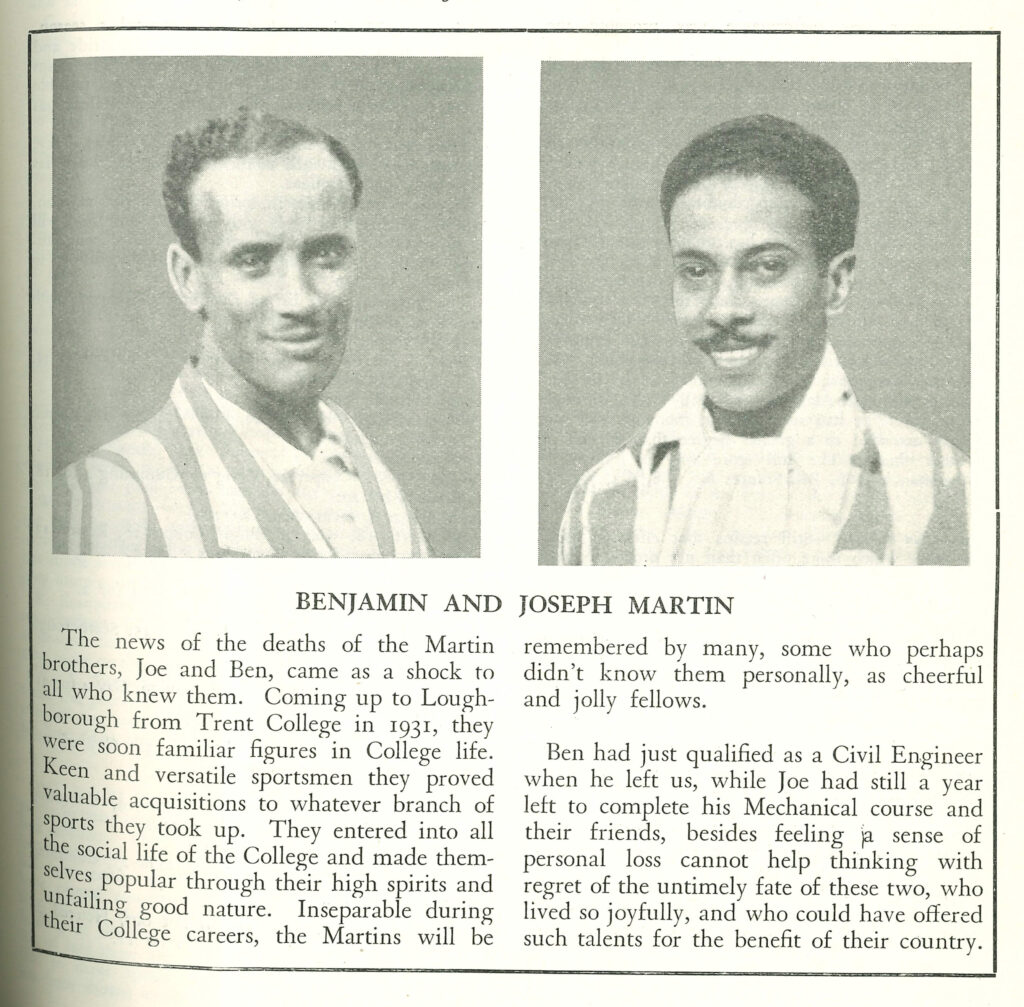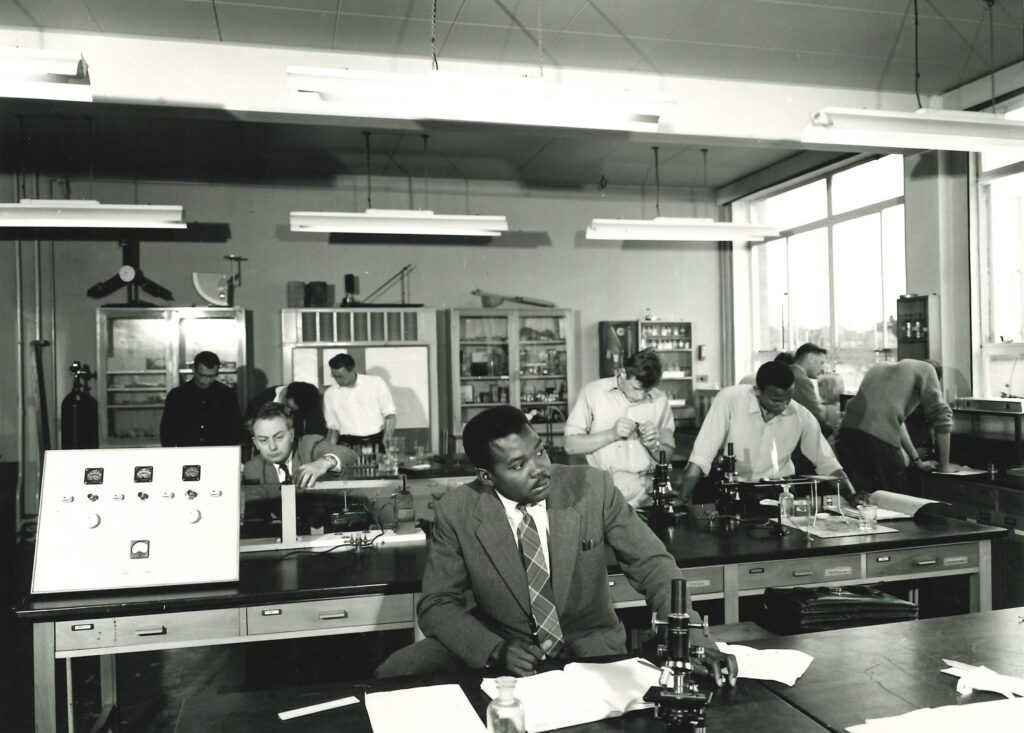Celebrating our students in Black History Month: Stories from the Archive
Camille Moret, the University Archivist, and Kerry O’Brien, Senior Library Assistant (Monographs and Textbooks) take us through the Archive.
When we are celebrating Black History Month, we turn to history sometimes with a critical eye, looking at moments when we as an institution or community might not have been as tolerant and welcoming as we might hope or expect. But, sometimes, individual stories reach us to remind us of times when we have come together as a community, embracing Black students for who they were and what they stood for.

Such is the journey of the Martin Brothers, who came to Loughborough College (as Loughborough University was called at that point) to study in the early 1930s. Yusef and Benyam Workinah Martin – known then as Joseph and Benjamin – were born in Ethiopia, sons of Hakim Workinah Eshete, the first Ethiopian to qualify as a medical doctor, and later Ethiopian Ambassador to London. Yusef studied Commerce and Mechanical Engineering, and Ben, Civil Engineering. The Martin brothers boarded in the newly opened Rutland Hall and were keen sportsmen: they both played cricket (Joe was captain in 1935), and Joe also played hockey and Ben rugby.
After graduating, they went back to Ethiopia and joined the country’s fight against the invading Italian army, acting as interpreters for the British Ambulance Service, as they were both bilingual in English and Amharic. They also helped with transporting supplies like gas masks, and did technical work munitions, before eventually joining the fighting on order from Emperor Haile Selassie. Ben, who was asked to take photos and write articles, implied in a letter to his father that he was the leader of the resistance group the ‘Black Lions’. Tragically, after surrender to Italy in May 1936, both brothers were put to work in Italy’s central workshop in Addis Ababa, and after the attempted assassination of the Italian Viceroy, Marshal Graziani, in February 1937, they were arrested at night and summarily shot, in what is known as “The Addis Ababa massacre”.
The news of their deaths reached England several months later and was extensively reported in the College Magazine The Limit, which shows how keenly felt their loss was by the community of students and staff. Yusef and Benyam’s story has been retold time and again over the years, their heroism and the mark they left on Loughborough College celebrated through talks and even a poem. The example of their journey (and their father’s), from promising graduates to war heroes, has been used in works questioning the dominion of colonising countries, such as Britain and Italy, over African ones like Ethiopia. The Martin family reminds us that Black heroes are very much present in history, if only we are willing to seek them out and recognise them.

Recognition is part of any celebration, not just in the past but also in what was the present just a moment ago. So, we also celebrate a more recent (relatively speaking, this is from the Archive after all!) Black alumnus, Paul Theophilus Lawrence. Originally enrolled in Biology with our predecessor, Loughborough Training College – a photograph shows him in the Science Laboratory in 1961; he obtained his Diploma in Handicraft in 1963. As a migrant from Nevis – an island nation state in the Caribbean – he was deeply involved in the social and political life of the Caribbean communities in Leicester. Thus, he helped found – and sometimes chaired – the Nevis Development Association and was an affiliate of LUCA, the Leicester United Caribbean Association, in the early 1970s. These associations are a testimony of the various experiences and complex relationships of each Caribbean Island with the United Kingdom. Paul saw that and all his life, fought for the needs specific to his island and community to be recognised.
Upon his return home to Nevis, in 1982, he fought for independence from British colonisation, leading independence proponents and activist campaigns; this was attained on 19 September 1983. But this achievement did not stop him, and he remained first and foremost a teacher, founding the first independent school on the Island, the Lynne Jeffers School Nevis, in the mid-1990s. He had gone back to Loughborough University in 1975-1976 and obtained a Bachelor of Education Studies in Design and Technology. There is no doubt everything he learnt he strove to pass down further, which is greatly inspiring. Paul also kept advocating for what he believed was right for his community and his island, occasionally writing in the St Kitts & Nevis Observer, almost up until his death last year.
We celebrate Paul, Yusef and Benyam, their achievements and their desires to always be the best version of themselves. We are proud to have shared their journeys as Black men from their countries to Leicestershire and back.
We would love for anyone inspired by these stories to share theirs or let us have their reflections on the stories we have just told. Please do so in the comments below or by emailing library@lboro.ac.uk.
Visuals:
- scan of the Limit obit (1937) with images of the Martin brothers.
- © Loughborough College, courtesy of Loughborough University Archive
- FG9.4.15_PaulLawrence_ScienceLab_Aug1961_R
- © Crown Copyright, courtesy of Loughborough University Archive
Equity, Diversity and Inclusion
Reflections, comments, discussion and opinion on EDI topics from Loughborough University staff and students